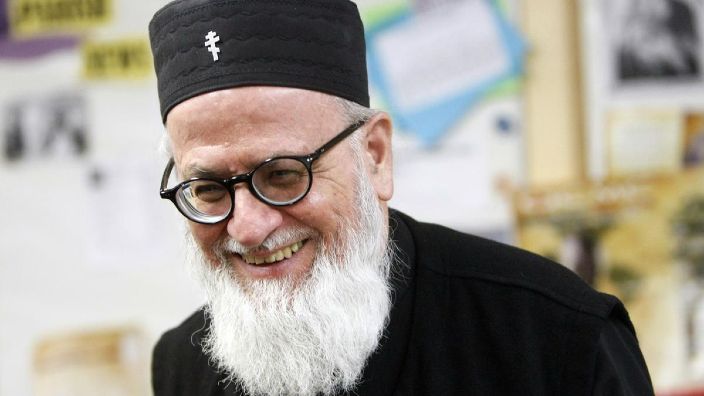By Ilias Karagiannis.
He has the visionary flame in his eyes, and his lively speech is dotted with the bits of his intelligence. Father Themistocles Adamopoulos is not the priest you are used to.
Child of Melbourne, a marxist rock star who renounced the mundane for Christ’s sake, and today in a waterless place, Sierra Leone, where the seven plagues of the Pharaoh have fallen, is the sire of hope for the pariahs of this world.
With the torch of faith mirrored in his eyes, restless at 77 years old, he does everything for a world that is forgotten by the West.
A few days ago he was in Athens to be honoured by the President of the Republic, Katerina Sakellaropoulou, with the “Argo” award for his humanitarian contribution and we did not miss the opportunity to meet him and have a pithy conversation with a missionary who ministers to pure love without discrimination.
The Greek Herald unblocks the bolted doors of memory, and takes us to other times, familiar to those who read these lines.
The award and the female president:
Father Themistoklis Adamopoulos left Australia in 2007 and settled in Africa. First to Kenya and then to Sierra Leone.
He has established the first university Orthodox College, the “African Orthodox University College”. Before that he studied theology and was awarded his degree from the Catholic Theological Seminary “Corpus Christi”. He attended the Holy Cross Theological Seminary in Boston and studied Hebrew and ancient Greek at Harvard University.
He then received his doctorate in Theology from Princeton University and returned to Australia, where from 1988 to 1998 he taught at The Sydney School of Theology “St Andrew’s” and the University of Sydney.
Today, he has contributed to the creation of an orphanage, a kindergarten, a school and the infrastructure that has greatly improved the daily lives of thousands of people in Africa.
In addition, he makes sure that children and women are provided with necessary goods, such as clothes, shoes and meals at a soup kitchen. The above were a reason for his award, which found him completely unprepared, as he confesses to The Greek Herald.
“I was in Sierra Leone when my phone rang and they told me they wanted to award me. I was surprised. I didn’t expect it from a secular, non-ecclesiastical organisation like Argo. You know, today the church is hostile to Europe. They don’t respect the church like they used to. People who go to temples are outnumbered. Everyone brings out the negatives,” says “Father Themi,” as he is better known in Sierra Leone.
“Maybe not in Greece but certainly in Europe. So there is a tendency to move away from the church. In this connection, therefore, the recognition of a non-ecclesiastical organisation of our work struck me. It was a great joy and honour and it turned out that in Greece there is still respect for the church.”
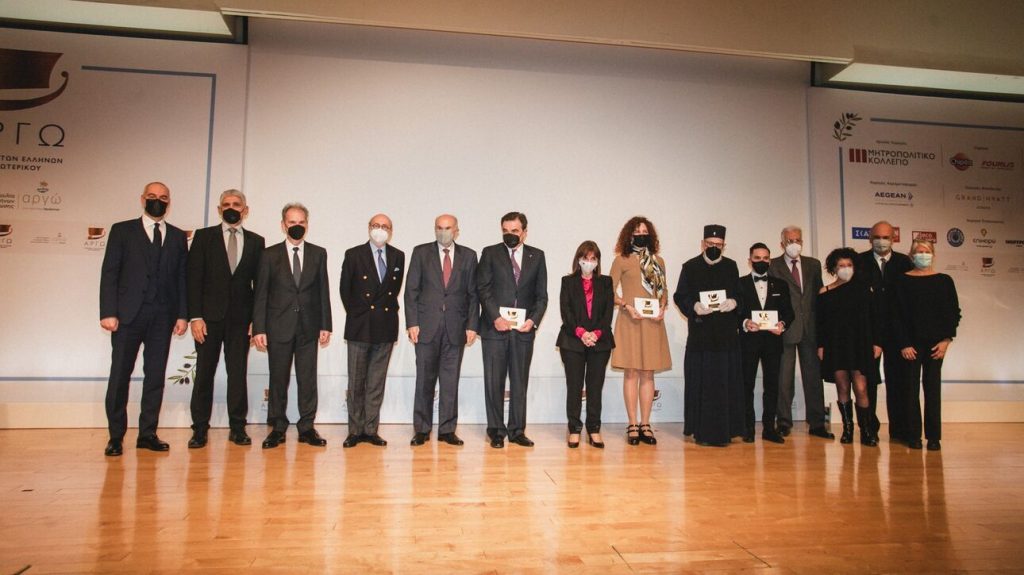
The award was presented by the President of the Republic, Katerina Sakellaropoulou. An unusual image for Greece until a few years ago to have a woman as a first citizen.
“Although I am Greek I have not lived in Greece more than 5 to 6 months in my entire life. Coming from Australia, where the position of the woman has been quite strong since the 1970s, when the wave of feminism flared up, it did not strike me that she is a female president of the Republic,” the Father says.
“From young children we have learned that man and woman have the same rights. I am glad that there is a woman president of the Republic in Greece. It doesn’t seem strange to me at all. Perhaps for Greece it was.”
Immigration to Melbourne and the first negative pictures:
His first steps in life took place in a mythical city for Hellenism: Alexandria, Egypt. “In those beautiful years I first felt the pride of a Greek of the Diaspora,” he says.
In the mid-1950s when he was about 10 years old, his family decided to emigrate. In a game of fate, his father decides to send a request for a visa to two embassies. Of Australia and Brazil.
“In Australia they responded to us immediately while in Brazil it took too long. I don’t know, maybe they were having a siesta” says Father Themistocles with his childish smile. “So my father said Australia looks a serious nation and we’re going there.”
And they sailed for a new, promising life, which in the early days, though, in Melbourne everything seemed nightmarish.
“We arrived by boat to Melbourne and the images we saw were unnerving,” he explains.
“The streets were full of mud. The toilets were outside the house and I remember my mother, who was a teacher, was on the verge of psychological collapse.
“From a house of our own in Alexandria, which at the time was very developed, with natives helping with the chores, we ended up in a residence that had the toilet outdoors.
“Everything seemed difficult in those days. My father, who was a chemist, was forced to work as a labourer.”
After a while of course everything changed. Father Themistocles’ mother found work as a teacher and his father as a chemist while he began to grow up having concerns.
Nature creative and insubordinate channeled his passion into music and politics. In the years of the 1960s, when humanity was vibrating by revolutionary movements, “Father Themi” read Marx and was the leader of the band “Flies”. He even sang at the side of Rock’s bad boy, Mick Jagger.
The enemy of the church and the passage from religions:
The future did not suggest that he would once wear cassock. “If you told me when I was 23 years old: ‘Themistocles in a few years you will become a priest I would … vomit ” says Father Themistocles in his spontaneous style.
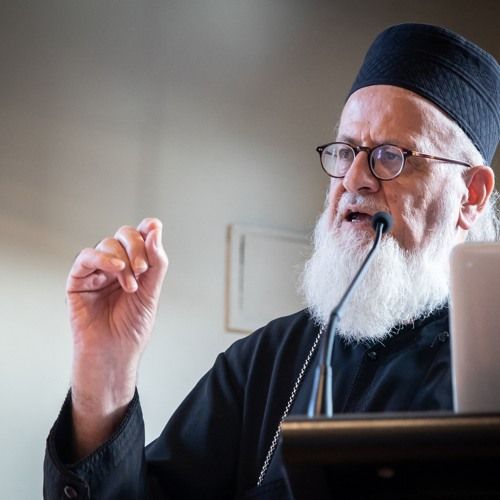
“The church was in those days my enemy. I thought it was taking advantage of the world. So if someone told me I was going to be a priest, I would say … whatttt? I was reading Marx at the time and I wanted the worker to rise up and not be exploited by his bosses.
“However, at some point reading about Christianity I realised that all that Marx was saying about solidarity with man had been written thousands of years ago.”
“Something happened and prompted me to start reading about the Bible. I saw something which I did not expect. It was something of a vision. It’s something I don’t want to talk about too much because I don’t want to lose it’s value. So when I saw it, what I saw led me to the search.”
But he did not immediately go to Christianity. Hinduism and Buddhism were in his earliest pursuits before he espoused to the depths of his existence Christianity.
Some of the readers of The Greek Herald may remember him many years ago going out into the streets of Melbourne and preaching the will of God with a cross in his hand.
“I was a fanatic at first. I read The Gospel day and night. My parents thought I was sick. Then I started going out into Melbourne squares with a cross and teaching. That was excessive but I wanted to show Christ that I was a new man.”
The social role of the church in Australia:
At the time when Father Themistocles’ march to Christianity began, orthodoxy occupied a prominent place in the community, as he confesses to us.
“The church in Australia also had a social role for the community. For example, Mr Costas, who all week endured the Australian over his head, treating him badly and cursing him and trying to endure because he was in need his family came to church on Sunday and felt differently because he was the president of the local community. At that time I was greatly helped by Athanasios Triantafyllou, who at that time was not yet a priest. He is currently in the parish of St Basil in Brunswick. He knew the Gospel by heart and better than the priests then” tells us Father Themistocles, who thanks to the late Archbishop of Australia, Stylianos went to Boston to study.
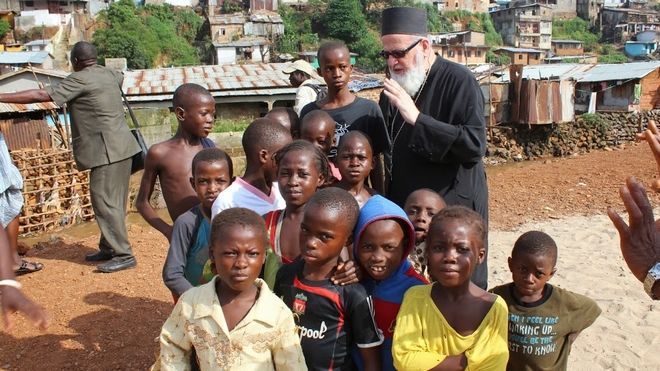
But because of him, as he tells us, he left the country permanently. A confrontation that led him to Africa.
“When I came back from America to Australia everything was fine. But I quickly found that we were losing a lot of people because the sermon was in Greek. Younger generations could not understand,” he said.
“So I went to Archbishop Stylianos and told him that in order to keep the faithful in churches we needed the sermon in English as well. He flatly told me no. We are Greeks said characteristically and reacted. There was a conflict between us and I was sad.
“Even more so as I watched the churches empty. I was going to my parish houses and everyone was telling me I don’t understand anything why I should come. I was very disappointed in that period. And so I thought I’d go somewhere else.
“I said after I was born in Alexandria that it might be time for me to return to Africa. I sent a letter to the then Patriarch of Alexandria, Peter and explained to him that I was a professor in Sydney and wanted to go to Africa. I also told Archbishop Stylianos and he gave me his blessing. I think with joy after what had happened.”
The great work in Africa and the Greeks of Australia:
Today Father Themistocles is in Sierra Leone, where he has done great work. We ask him to become the eyes of our readers and say what he would see if someone went there today.
“He would see orphanages, kindergartens, schools, a clinic with a doctor who has been studying in Europe. A modern two-storey school. The gratitude of the children when they saw the school will be unforgettable,” he says.
“I remember they were jumping around when they saw the new building. The situation is slowly improving. I remember in 2007 we had power for half an hour a day. Today the electric current is more stable. When I came, Sierra Leone was the poorest country in the world. Today it has improved a bit.
“The main problem in Sierra Leone is poverty. The father who has no money to send his child to school. The mother who has four children. Two on the shoulder and two on the arms. She walks like this because her husband has abandoned her. She must find a way to feed her children.”
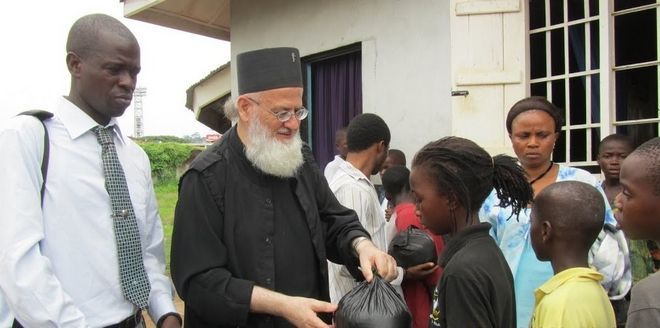
He tells us in a trembling voice of the great work of the churches. “If someone were to drive all the churches out of Africa tomorrow, 40 million people supported by their charity work would immediately die.
“I mean, look at this.
“A cappuccino costs 4 euros in Athens if you sit in the cafeteria. The 4 euro is 44,000 Leon (the Local Currency of the Sierra Leone). With this money a native can live with his family for two to three days. A cappuccino gives life to a family in Sierra Leone for two to three days”, says Father Themistocles, who in his speech during his award warmly thanked the Greeks of Australia.
“The Greeks of Australia have made a significant contribution to our work. Without our diaspora my work in Africa would not have been possible. They have contributed about 50% of the total offers we have received.
“At the same time from Greece we have the other 25% and from America the rest. I want you to write that there is an excellent team that helps me from Australia. It is called “Paradise 4 kids” and thanks to their help we have done a lot of good in Africa” concludes in a hearty confession the saint of Africa, as he is called.
* Those who wish to help the work of Father Themistocles can contact Louis Toumbas: ltounba@gmail.com
